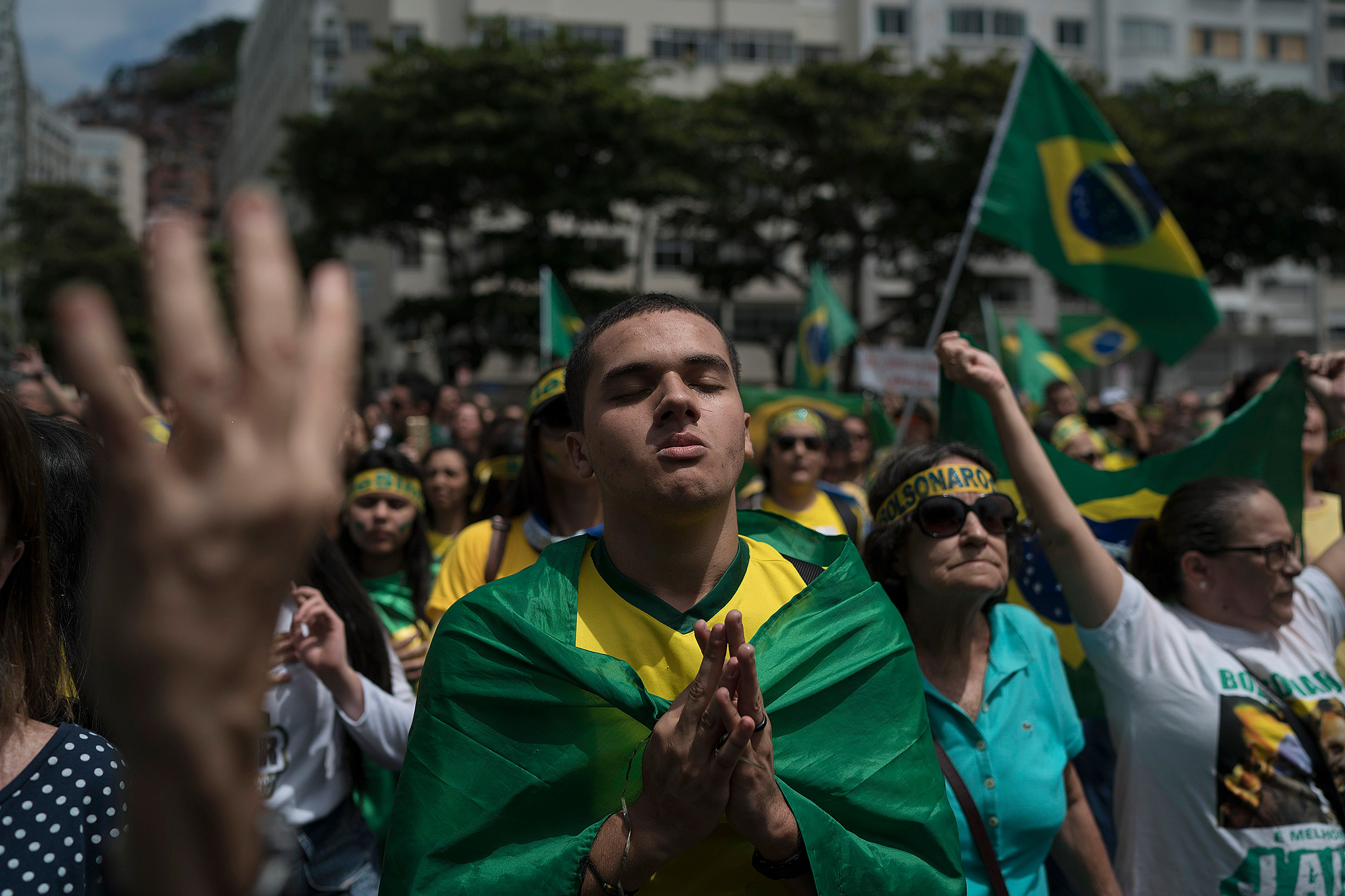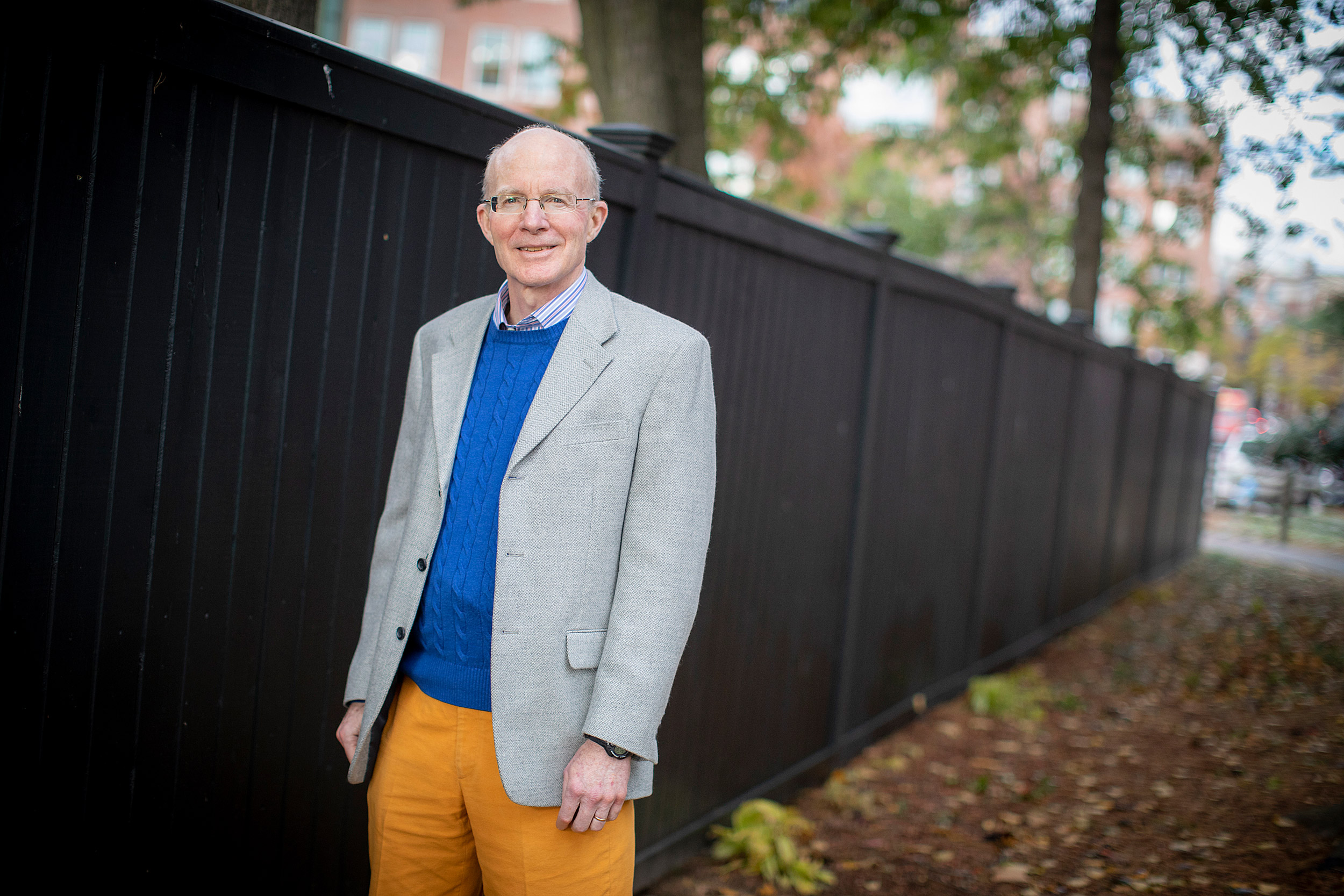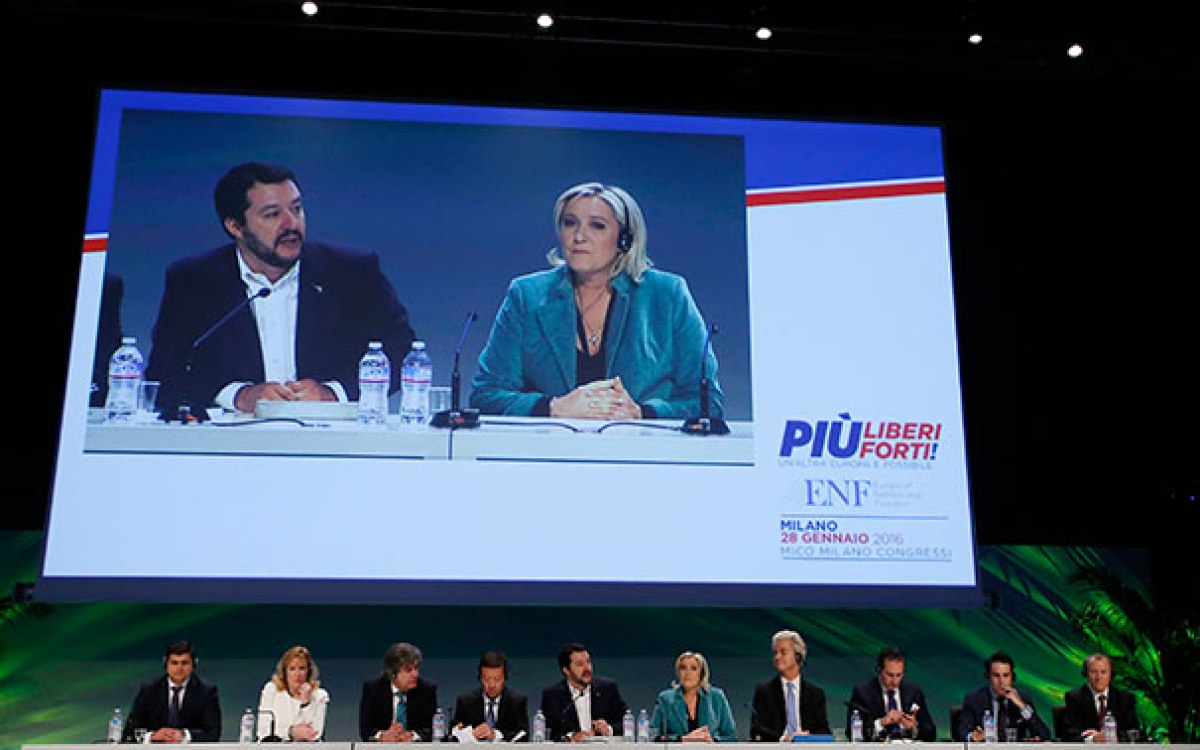
A man listens to Brazil’s anthem at a presidential campaign rally for Jair Bolsonaro in Rio de Janeiro.
AP photo
Brazil at the crossroads
Election of Bolsonaro is likely to test democracy there, and regionally
On Sunday, Jair Bolsonaro, a far-right populist with harsh views about women, gays, and blacks, was elected president of Brazil, one of the world’s largest democracies. To understand the factors leading to his election, the Gazette talked with Scott Mainwaring, Jorge Paulo Lemann Professor for Brazil Studies at Harvard Kennedy School (HKS).
Mainwaring spoke about Bolsonaro’s victory as part of the far-right populist wave that is sweeping the globe, the likely impact of Brazil’s election on Latin America, and the danger to Brazilian democracy that may be posed by this presidency.
Q&A
Scott Mainwaring
GAZETTE: Jair Bolsonaro has been called “the Brazilian Donald Trump.” Can you talk about the similarities between Bolsonaro and Trump?
MAINWARING: The similarities are that both have been viewed, I think correctly, as having racist and sexist discourses, with very authoritarian elements. Bolsonaro once said of a member of Brazil’s National Congress, “She’s too ugly; she’s not worth raping.” He also said that if he was ever elected president of Brazil, on the first day he’d shut down the National Congress. Both leaders have publicly supported torture — however, with a difference. Bolsonaro has supported torture of Brazilian and criminal suspects, and Trump has limited his favoring of torture to terrorist suspects. For people who highly value democracy and human rights, the similarities between Bolsonaro and Trump should be of concern.

“We should have no illusions about the erosion of democracy in Brazil,” says Scott Mainwaring, Jorge Paulo Lemann Professor for Brazil Studies at Harvard Kennedy School. “The question is not if it will erode, the question is how much.”
Rose Lincoln/Harvard Staff Photographer
GAZETTE: Are there any differences between Trump and Bolsonaro?
MAINWARING: Bolsonaro is far more extreme than Donald Trump. I’m not aware that Trump has been profoundly homophobic in his public discourse. Bolsonaro has said that if one of his sons were gay, he’d prefer that the son die.
GAZETTE: Some have said that Bolsonaro is similar to strongman Rodrigo Duterte of the Philippines. What’s your take on that?
MAINWARING: In terms of extrajudicial killings, rule of law, and human rights, Bolsonaro is much closer to Duterte than to Trump. A few years ago, Bolsonaro said that International Human Rights Day is a “day for losers.” Trump might think that, but I don’t think he has ever said something like that. But there are more similarities between Bolsonaro and Duterte than between Bolsonaro and Trump.
GAZETTE: Can you talk about the context that made the election of Bolsonaro possible? His election was unthinkable a few months ago.
MAINWARING: The context is one of deep crisis on three issues: the economy, corruption and public security, and the profound discredit of the left, centrist, and center-right establishment in Brazil. Brazil has an alarming public security crisis. It has a homicide rate about 6.5 times that of the U.S., and seven of the 20 most violent cities in the world are in Brazil. Secondly, in recent years, Brazil has had a recession much deeper and much longer than the U.S. recession of 2008‒2009. And the third factor is corruption, which I think was the biggest factor leading to Bolsonaro’s victory. Brazil has had the biggest corruption scandal in the history of democracy. Lula (Luiz Inácio Lula da Silva), the leader of the Workers’ Party and formerly beloved president of Brazil, is now in jail, but it’s not only him. One of Brazil’s most important entrepreneurs is in jail, and many Brazilian politicians and entrepreneurs are in jail or under investigation for corruption charges. The corruption scandal affected both the left and the right, so when you discredit both the left and the center-right establishment, who’s left standing?
GAZETTE: But why did Bolsonaro, who was a marginal politician as a senator, benefit from the public despair over corruption, crime, and the recession?
MAINWARING: Although Bolsonaro was not an outsider, by most standards — he has been in the National Congress for almost 28 years — he is such an extremist that he was able to position himself as an outsider. It’s an exaggerated comparison, but it’s like if Adolf Hitler had been in the German Parliament for 28 years as a very marginal figure. Because of his extremist views, many people saw him as something different. To my knowledge, Bolsonaro has no history of corruption, and at a time when corruption was a salient issue, that worked in his favor. He’s very outspoken, he has a very clear attitude — not proposals — about crime, and that is, “Kill the criminals,” and “Let more people have arms.” When 111 criminals were massacred in a São Paulo prison around 1993, he said, “It’s a shame that only 111 criminals were killed.” This kind of discourse is terrible policy, but it has a profound resonance in Brazil because of the fears over rising crime.
GAZETTE: What role did the political parties play in the collapse of the Brazilian political system?
MAINWARING: The Workers’ Party governed from 2003 to 2016, and it governed very ineffectually for much of this past decade. And when the commodity boom ended, the space for bad policies shrank radically, and then you got this horrible recession with very high unemployment. Now, half of Brazil profoundly rejects the Workers’ Party. This is not a historic constant. When Lula left office in 2010, he had an 83 percent approval rating. But the corruption scandals, the security problems, and the economic recession changed people’s opinion about the Workers’ Party.
A lot of Brazilians who supported Lula in 2010 now hate the Workers’ Party. A lot of this is a vote against that party. In the last two years, the party radicalized, moved to the left, and it presented Lula as the presidential candidate in 2018. But if the paramount concern in Brazilian voters’ minds is corruption, and you put forth Lula as a presidential candidate while he’s in jail on corruption charges, what message does that send?
GAZETTE: Were you surprised by the results?
MAINWARING: Six months ago, I would have said that Bolsonaro’s chances were low. When he was stabbed in a campaign rally on Sept. 6, he was one of five candidates who could possibly get to the second round, but the outcome was still unpredictable. Three weeks later, it seemed almost certain that Bolsonaro would get to the second round, and it also seemed that he’d have the better chance of winning. Right before the first round on Oct. 7, surveys show he had 38 percent of the vote. Everyone was surprised when he got 46 percent of the valid vote. At that point, I thought it was extremely likely that Bolsonaro would win, and nothing changed in the intervening three weeks.
GAZETTE: What are your expectations for his presidency?
MAINWARING: One can confidently say that he would be against environmental regulations, and there is every reason to believe that he would be a great supporter of agribusiness. We can be very confident that there will be less respect for the human rights of some groups. Brazil has a long record of high police impunity and many police killings, and we should expect this to get worse. We should expect him to govern in a relatively authoritarian manner.
There is a lot of room for doubt about the economy. Bolsonaro’s own past is deeply statist, and his chief economic adviser is a market-oriented economist who had said that Brazil should privatize its public firms, but Bolsonaro came out and contradicted him. Bolsonaro has said he won’t make concessions with the Congress, but his party has 51 seats out of 513 in the lower chamber. He has to make concessions.
And what would he do about corruption? His discourse about corruption is laudable, but what he doesn’t say is that it wasn’t only the left in Brazil that was corrupt; far more right-wing politicians have been accused and convicted of corruption than left-wing politicians. This has been an endemic problem in Brazil. You don’t end corruption just by saying “I’m against corruption.” About public security, his proposals have been very thin and sketchy. He did not run on very detailed policy proposals.
“The example of Trump made it possible for Bolsonaro with even a far more misogynistic, homophobic, and racist discourse to get elected.”
GAZETTE: What might be the impact of Bolsonaro’s election in the region?
MAINWARING: I think this makes it easier for other right-wing populists with outrageous discourses and policy proposals to emerge. We’re riding a wave of conservative populism across many countries in the world, most prominently in the United States. One of my esteemed Brazilian academic colleagues said, “Without Trump, there would be no Bolsonaro.” We can’t know empirically if that’s true, but it seems that there’s a perfectly reasonable hypothesis. The example of Trump made it possible for Bolsonaro with even a far more misogynistic, homophobic, and racist discourse to get elected. The countries in Latin America that would be most vulnerable are those with weaker institutions and deeper problems. That’s not Uruguay or Chile or Costa Rica, but it could be the rest of the region. In Latin America, with those three exceptions, states are not strong, party systems are not solid, and the recurrence of populists and often authoritarian ones, both on the left and the right, is frequent.
GAZETTE: What can we expect from this wave of far-right populism?
MAINWARING: Well, for a while there was a left-wing authoritarian populist wave in Latin America; the worst of it was Hugo Chávez, and the most influential by far. It seems that [Nicolás] Maduro, his successor, has ruined Venezuela. And then came Evo Morales in Bolivia, Rafael Correa in Ecuador, and Daniel Ortega in Nicaragua. Maduro and Ortega in effect have turned Venezuela and Nicaragua into electoral dictatorships, and they cannot hold free and fair elections because they would lose. Correa is out of office, and his successor is prosecuting him. Morales is still in office. But that left-wing wave has ended. The left lost in Argentina in 2015 and in Chile in 2017. Now, we have a right wave. But as long as voters can freely and fairly vote, and the mechanisms of democratic accountability are protected, democracy will be preserved.
But we should have no illusions about the erosion of democracy in Brazil. The question is not if it will erode, the question is how much. The best-case scenario is that the LBGT community, the press, and human rights defenders are more vulnerable to harassment and violence but there is not a profound erosion of democracy, and that the democratic institutions remain relatively solid. That’s the most optimistic scenario, but I think that’s too optimistic.





